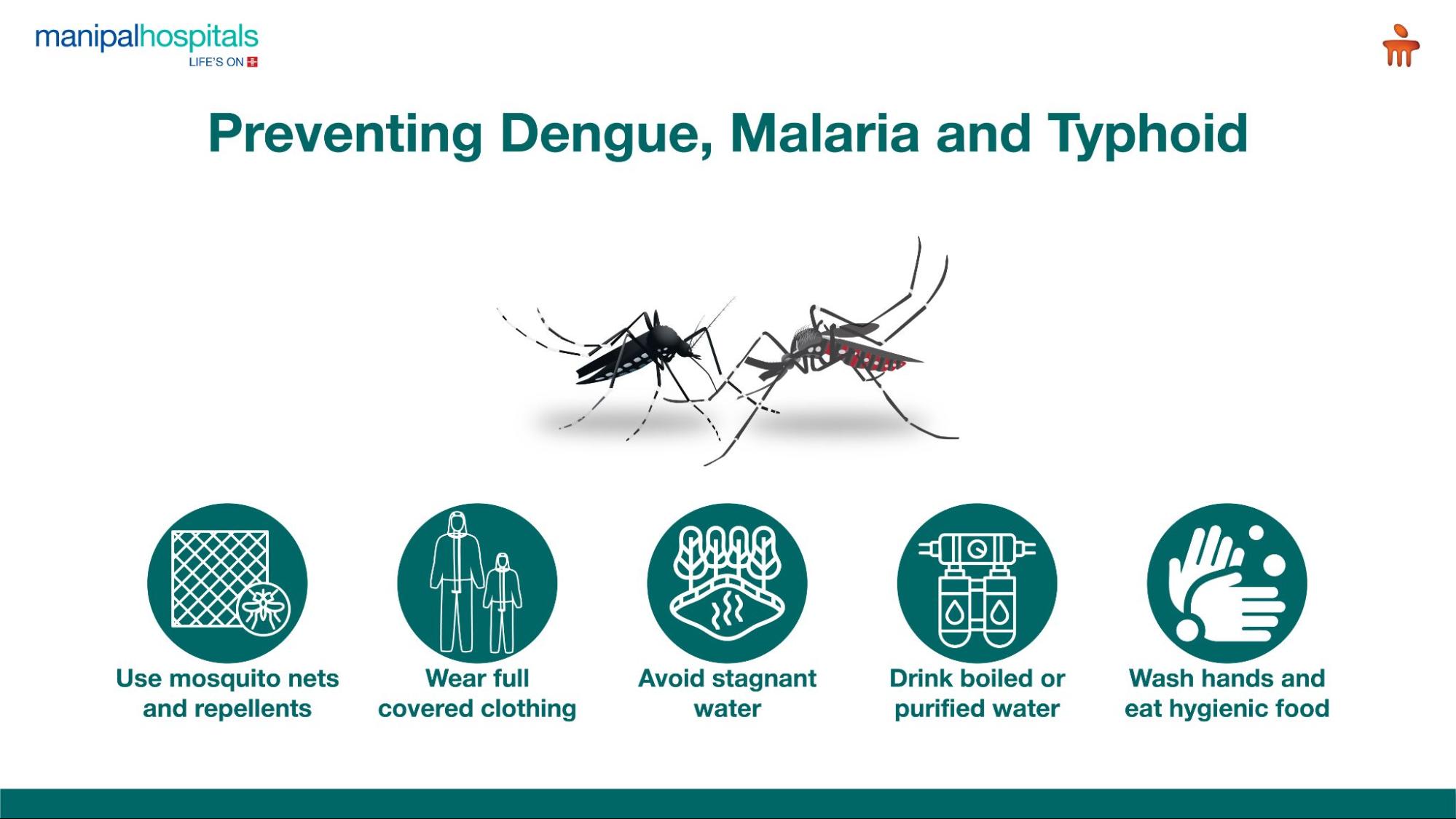Monsoons bring much-needed relief from the scorching heat, offering cooler temperatures, pleasant weather, and the joy of savouring seasonal delicacies. However, this monsoon bliss often turns into bouts of illness, as the season also invites unwanted guests like bacteria, viruses, and parasites. The combination of stagnant water, increased humidity, and poor sanitation creates the perfect breeding ground for infections. Among the most common monsoon illnesses are dengue, typhoid, and malaria—each of which can become serious if not prevented or treated on time.
The incidence of typhoid has been rising in recent years, with approximately 10 million cases reported in 2021, placing India among the countries with the highest burden of typhoid worldwide.1 Dengue, too, is following a similar trend and has become one of the most widespread vector-borne infectious diseases, with 233,519 reported cases in 2024.2,3 While malaria cases have shown a decline, it remains a life-threatening illness that can be effectively prevented through simple yet crucial precautions.
This blog will guide you through the symptoms of dengue, malaria, and typhoid, along with practical tips to prevent rain-related diseases and stay healthy this monsoon.
Synopsis
Why Does the Monsoon Bring Diseases?
Although it's one of the most loving seasons, it still brings a spike in illnesses. Mosquitoes, water, and contaminated food are the three media through which monsoon diseases can spread. The reasons behind this hike are:
-
Stagnant rainwater and humidity encourage mosquito breeding
-
Contaminated drinking water and foods, leading to infections
-
Compromised immune systems due to temperature fluctuations
-
Poor hygiene
All these factors make children and the elderly, especially those with comorbidities, more prone to these deadly monsoon diseases.
Dengue
This deadly mosquito-borne disease is caused by the Aedes aegypti mosquito, which also bites during the day and breeds in clean, stagnant water. It is a viral infection that is more common during monsoons. Most people have mild to moderate symptoms, but the illness can be fatal.
Preventing dengue is crucial, as there is no specific treatment for severe cases. Protection from Mosquito bites and early detection are the only effective ways to reduce the risk of complications and mortality.
Malaria
Malaria is a life-threatening disease caused by Plasmodium parasites but transmitted by the female Anopheles mosquito, which breeds in dirty or stagnant water and bites mainly at night. Just like dengue, its cases rise during the monsoon season. Malaria cases in India are declining as a result of government initiatives.
Still, preventing malaria is essential, as it causes many complications for children, adults, and pregnant women. Malaria can lead to respiratory distress, multiorgan failure, and death. To stay safe, wear protective clothing and use mosquito repellents to avoid bites.
Typhoid
Typhoid fever is a life-threatening bacterial infection caused by Salmonella typhi, transmitted through contaminated food or water. After transmission, the bacteria multiply in the human body and spread to the bloodstream, leading to severe symptoms. As water contamination increases during the monsoon season, their cases also spike.
Resistance to antibiotic treatment and lack of access to safe drinking water and sanitation add to the spread of typhoid cases. If left untreated, typhoid can lead to severe complications and death. Therefore, it's crucial to prevent typhoid by adhering to proper sanitation practices, upholding personal hygiene, and consuming purified water.
Key Symptoms
| Symptoms of Monsoon Diseases | ||
| Dengue | Malaria | Typhoid |
|
|
|
If you notice any of these symptoms, don’t ignore them and consult the doctor immediately for proper diagnosis and treatment of these monsoon diseases.
Monsoon Diseases Prevention

Whether it’s preventing dengue, malaria, or typhoid, these monsoon disease prevention tips can help keep these infections at bay. These include:
-
Make sure that there is no stagnant water in your house or nearby, such as in plant pots, coolers, tyres, buckets, etc., and cover them to avoid mosquito breeding.
-
Use mosquito nets and mosquito repellents, install window and door screens, and wear full-sleeved clothes, especially when outside, to avoid mosquito bites.
-
Drink only purified water or boiled water, avoid street food, especially uncooked items, and make sure to wash fruits and vegetables before eating to prevent typhoid.
-
Focus on personal hygiene by washing hands frequently before eating; keep feet dry and shower after getting drenched in rain to avoid fungal infections, and wash off germs.
-
Maintain proper sanitation in and around your house, as clean surroundings will lower the chances of infections.
-
Focus on boosting your immunity by eating balanced meals, seasonal fruits and vegetables.
-
Keep yourself hydrated and rest well to recover and stay resilient.
-
Eat light and freshly cooked meals, reduce intake of fats, and avoid dairy products during the monsoon season.
Conclusion
The beauty of the monsoon shouldn’t be dampened by poor health. Prevent rain-related diseases by following these prevention and general health tips. Boost your immunity, maintain cleanliness, and follow timely precautions to enjoy the rains while preventing malaria, dengue, and typhoid. Make sure your family follows this monsoon health guide to stay safe and sound this season. For more personalised advice or effective treatment for these monsoon diseases, consult our experts at Manipal Hospitals, Dhakuria.
FAQ's
The most common monsoon infections are: cold, flu, diarrhoea, typhoid, dengue, malaria, and fungal skin infections. Follow proper precautions to stay safe.
To keep yourself and your family disease-free during the monsoon, boost their immunity by consuming vitamin-rich fruits and vegetables, like citrus fruits and leafy vegetables; staying hydrated; getting enough sleep; and exercising regularly.
Some monsoon infections are mild and get better with time. However, typhoid, dengue, and malaria can become life-threatening if they are not treated promptly. Early diagnosis and treatment can help.
The monsoon is the perfect time for breeding mosquitoes, bacteria, and viruses, as the humidity is high and stagnant water is available.
You can schedule an appointment with our doctors at Manipal Hospitals, Dhakuria, by contacting us or visiting our website.
Visit: https://www.manipalhospitals.com/dhakuria/specialities/internal-medicine/
Contact no: 033 6907 0001






















 6 Min Read
6 Min Read














